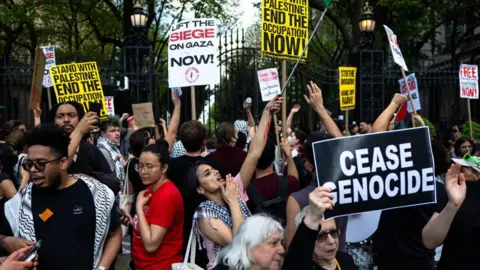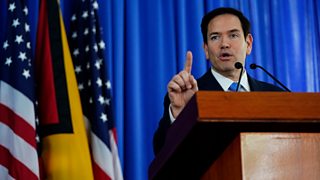
Columbia University’s interim president has resigned her role just one week after the Ivy League university agreed to change several policies to satisfy demands from the Trump administration.
Katrina Armstrong had led the university since August, after the previous president resigned over her handling of protests against Israel’s military operation in Gaza.
Columbia has drawn ire from Donald Trump, who claims that it and other schools have tolerated antisemitism and the harassment of Jewish students.
Trump has already threatened to withhold some $400m (£309m) in federal funding for the school as his administration continues to target those involved in campus protests with deportation.
Katrina Armstrong will return to her previous role leading’s Columbia’s medical centre, the university said in a statement on Friday. She will be replaced by Board of Trustees Co-Chair Claire Shipman, who the school said would serve as acting president.
“Dr Armstrong accepted the role of interim president at a time of great uncertainty for the University and worked tirelessly to promote the interests of our community,” David J Greenwald, chair of the university’s board of trustees, said in a statement.
In the university’s statement, Mrs Shipman wrote: “I assume this role with a clear understanding of the serious challenges before us”.
She said would “act with urgency” to advance the school’s mission and implement “needed reforms”, along with protecting its students and uphold “academic freedom”.

Mrs Shipman, a journalist who previously worked for several US media outlets, added that once a new permanent president has been chosen, they will oversee a review of the university’s leadership “to ensure we are best positioned for the future”.
Last week, Columbia agreed to several demands from the Trump administration, including a ban on face masks at protests and a change in oversight of some academic programmes after the administration said it planned to withhold millions in federal funds.
It’s unclear whether the funds will be reinstated, though a lawsuit was filed by some of the school’s faculty over the cuts.
The New York college was the epicentre of pro-Palestinian protests on college campuses last year against war in Gaza and US support for Israel.
It is not only Columbia that has faced funding cuts, the Trump administration has warned 60 universities that funding may be cancelled if allegations of antisemitism on campuses are not addressed.
Earlier this month, the Secretary of Education announced that it was pulling federal funding because of “relentless violence, intimidation, and antisemitic harassment” which went “ignored” by university authorities.
This all comes in the wake of a high-profile arrest of Mahmoud Khalil, a Columbia graduate and campus activist. He was detained by federal immigration authorities earlier this month.
Mr Khalil, a legal permanent US resident, faces deportation for his role in the 2024 campus protests.
US President Donald Trump has repeatedly alleged that Mr Khalil, and other pro-Palestinian activists, support Hamas, a group designated a terrorist organisation by the US.
The 30-year-old’s lawyers say he was exercising free speech rights to demonstrate in support of Palestinians in Gaza and against US support for Israel. They accused the government of “open repression of student activism and political speech”.